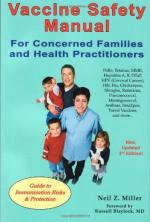|
This section contains 2,109 words (approx. 8 pages at 300 words per page) |

|
Vaccine administered, usually to a baby or child, to prevent infection with a specific serious illness.
People are given immunizations to protect them from serious illnesses. The vaccines used in immunization are actually weakened doses of the organism that causes the disease. These organisms trigger the person's own immune system to produce antibodies against the disease. In this way, if the person ever comes into contact with the disease, his body will be prepared to fight it. Immunization schedules vary widely from country to country. In the Unites States, the American Academy of Pediatrics (AAP) issues recommendations for immunization of babies and young children. Eight major childhood diseases are covered by this schedule: polio, measles, mumps, German measles (rubella), whooping cough (pertussis), diphtheria, tetanus (lockjaw), and meningitis and other haemophilus infections. Although in most developed countries these diseases are not very common, any one of them could cause...
|
This section contains 2,109 words (approx. 8 pages at 300 words per page) |

|


